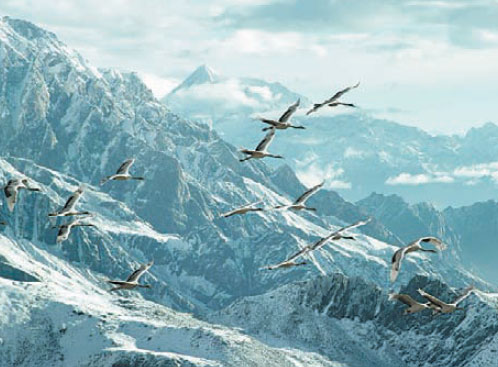Walk on the wild side
Celebrated director Lu Chuan has gained a new perspective on the animal kingdom while working on a coproduction with Walt Disney Studios in China, he tells Xu Fan.
Lu Chuan has been making films for the past 17 years but the changes he has encountered at work in the last few years have been huge.
The Chinese director now finds himself speaking English more frequently, leading members of international filmmaking units and even supervising shoots in China's remote areas from Beijing.
|
Born in China, the upcoming Disneynature feature directed by Lu Chuan, focuses on the lives of endangered animals in China. |
The film is being made jointly by Disneynature, a film label of Walt Disney Studios and Lu's Chinese film studio.
The Sino-US production will be released in China ahead of its 2017 world debut.
Typically, foreign films in China are released either simultaneously with the rest of the world, or a few days after their global release.
The film covers the lives of five animal families in China - snow leopards, giant pandas, snub-nosed monkeys, Tibetan antelopes and red-crowned cranes.
Lu's international camera units - from Germany, Britain and the United States - went deep into the animals' habitats and filmed for 18 months.
"It's my first English-language film, and it was a great opportunity to see how the world's top wildlife camera crews work," Lu, 45, tells China Daily over phone.
Although the trailer of the film makes it appear like a documentary, Lu says it is actually a "narrative feature".
"We have a script which focuses on the stories of the animal families," he says.
Interestingly, Lu, originally had a more ambitious plan for the film.
China is home to more than 120 endangered wildlife species, and Lu had initially selected 10 for the film. But his list was cropped and among the animals left out was the Asian elephant as it is found in India as well.
For the director, Born in China is not his first animal-themed film.
His award-winning Kekexili: Mountain Patrol (2004) is based on a volunteer patrol that tries to protect endangered Tibetan antelopes from poachers.
But the Disneynature film gave him a new understanding of the craft and filmmaking management.
He found that the main priority of the five teams of photographers, who were each assigned one species, was "not to disturb the animals or the locations".
"Each team had up to 20 people. But, after they completed preparations for the shoot, only the photographer and an assistant would stay on in the wild, with the rest leaving the area," says Lu.
"The cameramen would transmit footage every two or three days if they got some interesting moments. But the editing was a torture," he adds.
With the snow leopards, for instance, it was very hard to get the right footage for sequences, so Lu was forced to rewrite this bit of the story.
"Changes in the environment have forced the snow leopards to expand their range of movement from 20 kilometers earlier to 80 now. So, this made it challenging when it came to following them," he says.
The wild giant panda, described by Lu as a "lonely creature", and the Tibetan antelope, which moves hundreds of kilometers every summer, were also challenging when it came to filming.
Though the film took more time than his other projects, Lu says it was worthwhile, as it gave him a lot of insight into both nature and people.
Lu says while China has enhanced its protection of endangered species and natural habitats in recent years, an expanding population and increasing urbanization has meant a shrinking space for wild animals.
Expressing concern about this trend, he says: "If a country had no wild animals it will be tragic."
Besides Born in China, Lu is now involved in another English film, River Town.
Based on American author and journalist Peter Hessler's best-selling memoir River Town: Two Years on the Yangtze, the film is produced by Jamie Gordon and Courtney Potts from Fugitive Films.
While Lu is reluctant to give details of the film, he says American scriptwriter Tristine Skyler is now working on the film.
The book is about Hessler's teaching experience as a Peace Corps volunteer in a remote town in southwestern China in the 1990s.
Lu says the most interesting part for him is that it reflects the life of ordinary Chinese amid the country's unprecedented transformation.
An English major, Lu does not face problems with the language, which is a barrier for many Chinese directors when it comes to working internationally.
His English skills have also helped him earn popularity in English-speaking film markets.
Lu who recently won two awards at the 2016 WorldFest-Houston, one of North America's longest-running film festivals, has just returned from a trip of Britain, where he supervised the post-production work for Born in China besides delivering a speech at Oxford University.
Lu first gained international recognition in 2009 for City of Life and Death, a war epic based on the 1937 Nanjing Massacre.
His earlier works of note include The Missing Gun (2002) and Kekexili: Mountain Patrol (2004).
In recent years, Lu has directed several big-budget commercial films, such as the Daniel Wu-starrer The Last Supper and adventure fantasy Chronicles of the Ghostly Tribe.
But despite his big-budget work, Lu is widely regarded as a diligent filmmaker who works hard to strike a balance between art and commercial interests.
"No matter how the market behaves, I believe the only thing that will earn you a spot in (cinematic history) is quality films," he says.
Contact the writer at xufan@chinadaily.com.cn



















